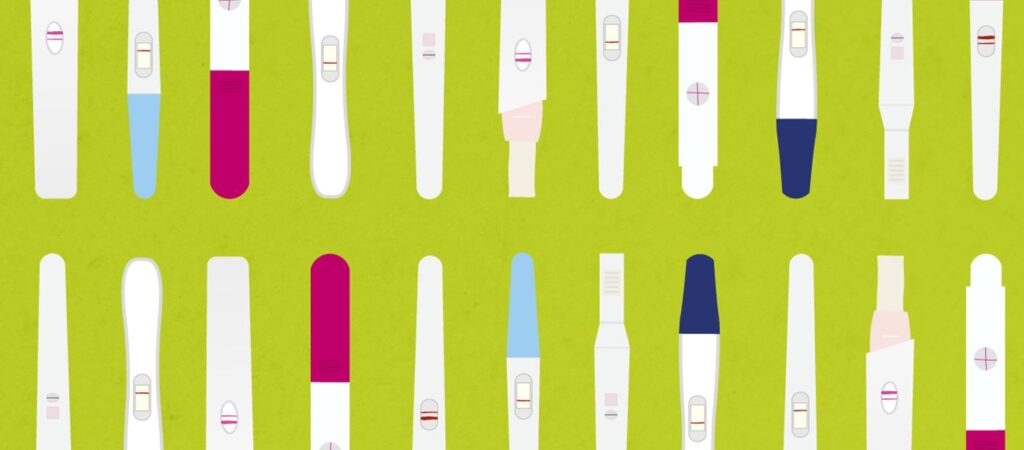
Waiting for your period to arrive can be agonizing if you think you might be pregnant. Whether a positive pregnancy test would be good news or not, you’ll probably find yourself rushing to the loo at every real or imagined sign of your period, and on high alert for any symptoms of pregnancy. So if you’re wondering if it’s time to buy that pregnancy test, here are some of the early pregnancy signs to watch out for.
What are the early signs of pregnancy?
The most obvious sign of pregnancy is a missed period. But even before your period is due, it’s possible that you might notice some pregnancy symptoms. One of the earliest signs is a tingling or prickling sensation in your breasts, particularly around your nipples. Some women get this feeling when they have been pregnant for just one week.
Other signs and symptoms of pregnancy to watch out for include:
Changes to the way your breasts look feel
In the early weeks of pregnancy you may notice that your breasts look bigger. They might feel lumpy and tender to touch too. Your nipples can look more prominent and the ring of skin around your nipples, called the areola, might look plumper and darker. Veins in your breasts may start to look more prominent and noticeable as well.
Nausea and vomiting
You probably know this as morning sickness, but it can happen at any time of day. Nausea can start just a few weeks into your pregnancy and can last for several months.
Foods and drinks that you used to enjoy may turn your stomach now and make you feel sick. Even just the smell of food cooking might be enough to make you queasy. You might start to salivate more and get a metallic taste in your mouth too.
Needing to wee more often
This usually starts about a month after you became pregnant. Changes to your hormones are the cause. Although you might be urinating more often, you shouldn’t have any pain or a burning feeling. If you do, get it checked out. You may have an infection called cystitis.
Spotting and cramping
Even if you’re pregnant, you may still have some very light vaginal bleeding and cramps that feel like period pain. It tends to happen a couple of weeks after your period was due. If you’re excited about being pregnant, it can be a worrying time. The bleeding should stop on its own, but if it gets heavier, contact your MSI provider for advice.
Feeling tired
Pregnancy can be exhausting, especially in the first few months. You might find yourself struggling to stay awake, even in the middle of the day.
Does everyone get pregnancy symptoms?
No. Some women experience many pregnancy symptoms, especially in the early weeks. But others don’t notice any changes at all.
The only sure way to tell if you’re pregnant is to take a pregnancy test.
How do I use a home pregnancy test kit?
Pregnancy tests use your wee to find out if you’re pregnant or not. They look for a hormone in your wee that you’ll only have if you’re pregnant.
Read the instructions carefully before you start as the tests can differ. Some will ask you to wee directly on to the test stick, or you might need to wee into a cup, and then dip the test stick in to your wee. Or you may have to move a small amount of wee using a dropper into a pregnancy test container.
Pregnancy tests usually take a few minutes to work. Waiting for the result to appear can be nerve wracking, whatever result you’re hoping for.
Pregnancy tests are very reliable. If you see a positive result you can feel assured that this is accurate.
If it’s negative, but you’re still sure you feel pregnant, wait a few days then take another test. The levels of the pregnancy hormone the test will look for in your wee will get higher each day so you may get a positive result next time.
How soon can I take a pregnancy test?
You can take a pregnancy test from the day your period is due. Most pregnancy tests are sensitive enough to detect the pregnancy hormone in your wee at this stage.
Although you may be anxious to find out if you’re pregnant, testing too early may not give you a reliable result. You may need to test again if your first test is negative but your period still doesn’t arrive.
Can I make my own a pregnancy test?
You might have heard about ways to test for pregnancy using household items, such as salt or toothpaste. This usually involves mixing the substance with your wee and then waiting to see if a reaction happens, such as fizzing or a change in colour.
These experiments cannot tell you if you’re pregnant or not. The best way to find out for sure is to buy a pregnancy test from a shop or pharmacy.
If you find out that you are pregnant, we can help you decide what to do next. Contact us to talk in confidence to one of our advisors.





